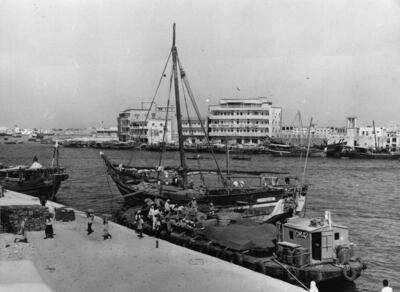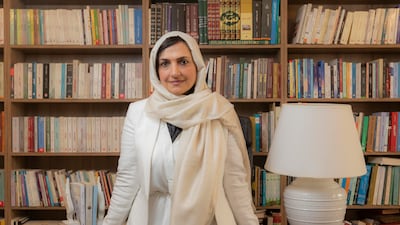Reem Alkamali became the first Emirati writer to be nominated for the International Prize for Arabic Fiction when Rose’s Diary made the longlist in January.
The Arabic novella was shortlisted in March and is in the running for the annual award that includes a $50,000 cash prize and a guaranteed English translation. The award ceremony is set to take place in Abu Dhabi on May 22.
Alkamali says the novel’s root idea, as well as the two years of research and writing it took to finish it, were driven by a single question.
“Where were all the female writers in the Emirates before the establishment of the UAE?” she tells The National. “To be more precise, who was writing creative short stories and novels in the 1960s?”
When the United Arab Emirates was established in 1971, schools were developed locally and education became free for all citizens. Primary education, meanwhile, became mandatory.
But even before the union, there were vigorous teaching initiatives for Emirati boys and girls, with schools running chiefly under Kuwaiti curriculum and supervision.
“There were schools operating in the 1940s and 1950s, and women had an important position in education,” Alkamali says. “Many went on study trips. There were also many women poets. But despite that, why couldn’t I find a story written by an Emirati woman in the 1960s?”
There were also many women poets. But despite that, why couldn’t I find a story written by an Emirati woman in the 1960s?
Reem Alkamali
The young heroine of Rose’s Diary is a materialisation of Alkamali’s frustration. Rose is a student living in Dubai's neighbourhood of Shindagha in the 1960s. A natural storyteller and a bookworm with a precocious grasp of the Arabic language, she wafts between her reveries and the world around her, jotting down her observations in secret notebooks.
After the death of her mother, Rose’s uncle refuses to allow her to travel to Damascus to study Arabic literature. Angry and frustrated, she unleashes her torrent of emotions in writing. Real events, musings about social norms and existential issues are transformed into stories, plays, confessions and letters in Rose’s secret notebooks.
“She had a great awareness, as a young girl writing about politics, economics, history, colonialism, sadness, and living stories from that era,” Alkamali says, of her heroine.
One topic that takes centre stage in the 120-page work is the construction that took place in Dubai in the 1960s, which is especially fascinating given they are the maiden phases of the city’s development after oil was discovered in the UAE. In the book, Rose reflects upon traditional architectural designs and engravings that are fading “in the face of the advancing cement.”
“I think readers enjoyed those parts,” Alkamali says. “The conversation around traditional architectures.”
Rose’s Diary is a compact but rich read. Alkamali says she didn’t expect the book to be nominated for the Ipaf award, and only found out she had made the shortlist after her friends began to call to congratulate her.
Novellas don’t get much attention in the Arab world, Alkamali says, as they are caught in the limbo between short stories and novels. Yet, the form is a challenging one, requiring precision.
“The great writers have all tried their hand at writing a novella at some point,” she says. “Novellas have rules. The narrator is usually the protagonist and is confined in their inner world. Rose narrates from her inner life, and we get allusions of the lives of passers-by; Rose doesn’t delve into their thoughts. She is succinct.”
A journalist for the Arabic newspaper Al Bayan, Alkamali’s previous fiction works include 2013’s The Sultanate of Hormuz, which won the 2015 Owais Prize for Creativity, and 2018’s The Statue of Dalma, which won the Sharjah Award for Arab Creativity.
Alkamali has currently started working on a new project, and she says she is especially enthusiastic about the idea.
“I have a good idea I’m working on,” she says. “An idea like this doesn’t come along often. I’ve only written a few pages, but I am not in a hurry. It is a project that can take three years. It’s an expansive piece of work. By meaning and length.”
In an interview with the Ipaf website, Alkamali hinted that her coming novel will be connected to old Gulf manuscripts about the sea.
“Where have they all gone? There were so many of them.”
The book, she said, will begin in the 15th century, at the time of the famous navigator Ahmad ibn Majid, who was born in Julfar, or present-day Ras Al Khaimah.
"The second time period is the 18th century, when the East India Company was active, and shows the negative consequences of economic private interests. The company used to carry the manuscripts to England, together with the spoils of archaeology from southern Iraq, across the Arabian Gulf," she told the website.
"The novel then moves into the present day and tells of rich intellectuals who passionately collect old manuscripts as a hobby.”
Springtime in a Broken Mirror,
Mario Benedetti, Penguin Modern Classics
Killing of Qassem Suleimani
KILLING OF QASSEM SULEIMANI
KILLING OF QASSEM SULEIMANI
All the Money in the World
Director: Ridley Scott
Starring: Charlie Plummer, Mark Wahlberg, Michelle Williams, Christopher Plummer
Four stars
Company%20Profile
%3Cp%3E%3Cstrong%3EName%3A%3C%2Fstrong%3E%20Neo%20Mobility%3Cbr%3E%3Cstrong%3EStarted%3A%3C%2Fstrong%3E%20February%202023%3Cbr%3E%3Cstrong%3ECo-founders%3A%3C%2Fstrong%3E%20Abhishek%20Shah%20and%20Anish%20Garg%3Cbr%3E%3Cstrong%3EBased%3A%3C%2Fstrong%3E%20Dubai%3Cbr%3E%3Cstrong%3EIndustry%3A%3C%2Fstrong%3E%20Logistics%3Cbr%3E%3Cstrong%3EFunding%3A%3C%2Fstrong%3E%20%2410%20million%3Cbr%3E%3Cstrong%3EInvestors%3A%3C%2Fstrong%3E%20Delta%20Corp%2C%20Pyse%20Sustainability%20Fund%2C%20angel%20investors%3C%2Fp%3E%0A
Australia tour of Pakistan
March 4-8: First Test, Rawalpindi
March 12-16: Second Test, Karachi
March 21-25: Third Test, Lahore
March 29: First ODI, Rawalpindi
March 31: Second ODI, Rawalpindi
April 2: Third ODI, Rawalpindi
April 5: T20I, Rawalpindi
The specs
Engine: 5.0-litre V8
Power: 480hp at 7,250rpm
Torque: 566Nm at 4,600rpm
Transmission: 10-speed auto
Fuel consumption: L/100km
Price: Dh306,495
On sale: now
RESULTS: 2018 WORLD CUP QUALIFYING - EUROPE
Albania 0 Italy 1
Finland 2 Turkey 2
Macedonia 4 Liechtenstein
Iceland 2 Kosovo 0
Israel 0 Spain 1
Moldova 0 Austria 1
Serbia 1 Georgia 0
Ukraine 0 Croatia 2
Wales 0 Ireland 1
AI traffic lights to ease congestion at seven points to Sheikh Zayed bin Sultan Street
The seven points are:
Shakhbout bin Sultan Street
Dhafeer Street
Hadbat Al Ghubainah Street (outbound)
Salama bint Butti Street
Al Dhafra Street
Rabdan Street
Umm Yifina Street exit (inbound)
HIJRA
Starring: Lamar Faden, Khairiah Nathmy, Nawaf Al-Dhufairy
Director: Shahad Ameen
Rating: 3/5
Key facilities
- Olympic-size swimming pool with a split bulkhead for multi-use configurations, including water polo and 50m/25m training lanes
- Premier League-standard football pitch
- 400m Olympic running track
- NBA-spec basketball court with auditorium
- 600-seat auditorium
- Spaces for historical and cultural exploration
- An elevated football field that doubles as a helipad
- Specialist robotics and science laboratories
- AR and VR-enabled learning centres
- Disruption Lab and Research Centre for developing entrepreneurial skills
Key findings of Jenkins report
- Founder of the Muslim Brotherhood, Hassan al Banna, "accepted the political utility of violence"
- Views of key Muslim Brotherhood ideologue, Sayyid Qutb, have “consistently been understood” as permitting “the use of extreme violence in the pursuit of the perfect Islamic society” and “never been institutionally disowned” by the movement.
- Muslim Brotherhood at all levels has repeatedly defended Hamas attacks against Israel, including the use of suicide bombers and the killing of civilians.
- Laying out the report in the House of Commons, David Cameron told MPs: "The main findings of the review support the conclusion that membership of, association with, or influence by the Muslim Brotherhood should be considered as a possible indicator of extremism."
The%20specs
%3Cp%3E%3Cstrong%3EEngine%3A%20%3C%2Fstrong%3E3.0%20twin-turbo%20inline%20six-cylinder%0D%3Cbr%3E%3Cstrong%3ETransmission%3A%20%3C%2Fstrong%3Eeight-speed%0D%3Cbr%3E%3Cstrong%3EPower%3A%20%3C%2Fstrong%3E503hp%0D%3Cbr%3E%3Cstrong%3ETorque%3A%20%3C%2Fstrong%3E600Nm%0D%3Cbr%3E%3Cstrong%3EPrice%3A%20%3C%2Fstrong%3Efrom%20Dh400%2C000%20(estimate)%0D%3Cbr%3E%3Cstrong%3EOn%20sale%3A%20%3C%2Fstrong%3Enow%3C%2Fp%3E%0A
THREE
%3Cp%3EDirector%3A%20Nayla%20Al%20Khaja%3C%2Fp%3E%0A%3Cp%3EStarring%3A%20Jefferson%20Hall%2C%20Faten%20Ahmed%2C%20Noura%20Alabed%2C%20Saud%20Alzarooni%3C%2Fp%3E%0A%3Cp%3ERating%3A%203.5%2F5%3C%2Fp%3E%0A
Some of Darwish's last words
"They see their tomorrows slipping out of their reach. And though it seems to them that everything outside this reality is heaven, yet they do not want to go to that heaven. They stay, because they are afflicted with hope." - Mahmoud Darwish, to attendees of the Palestine Festival of Literature, 2008
His life in brief: Born in a village near Galilee, he lived in exile for most of his life and started writing poetry after high school. He was arrested several times by Israel for what were deemed to be inciteful poems. Most of his work focused on the love and yearning for his homeland, and he was regarded the Palestinian poet of resistance. Over the course of his life, he published more than 30 poetry collections and books of prose, with his work translated into more than 20 languages. Many of his poems were set to music by Arab composers, most significantly Marcel Khalife. Darwish died on August 9, 2008 after undergoing heart surgery in the United States. He was later buried in Ramallah where a shrine was erected in his honour.




